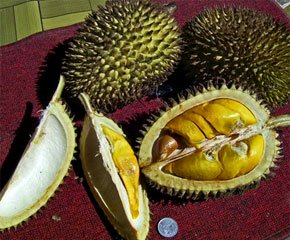The durian, possibly the world’s smelliest fruit, stirs up powerful emotions, and efforts by a Thai scientist to eliminate the stink, has outraged fans of Asia’s “king of fruits”.
Its detractors liken the durian’s odor to decaying flesh, rotten eggs or stale vomit. Others have suggested various combinations of pig excrement, sweaty socks, turpentine, unlit gas and onions.
But lovers of the yellow, spiky-shelled fruit say the sulphurous scent is part of the eating pleasure.
“It’s not interesting if durian has no smell – it would be like eating processed or packaged food,” said Nguyen Huong Giang, a 34-year-old development worker in Hanoi, the Vietnamese capital.
“I am proud to eat something that smells so strong and that other people cannot eat,” she said.
Nevertheless, Songpol Somsri of Thailand’s Horticulture Research Institute believes an odorless durian could attract millions of new consumers to the fruit, which is banned from many Asian hotels, airlines and public transportation.
“I was born in a durian orchard; to me the fruit is very special,” Songpol told Reuters at his office in Bangkok. “But people are put off by the smell. I want more people to enjoy the taste of durian.”
Three decades of painstaking cross-breeding and testing at an orchard near the Cambodian border has produced “Chantaburi No. 1”, a new strain of durian with a very mild odor.
Songpol is cultivating seedlings he hopes to distribute to farmers for commercial production next year. Removing the smell has taken nothing from the fruit’s flavor, he said.
“The flesh is golden, the taste is sweet and creamy, the texture is very fine,” the government scientist said. Thailand is already the world’s biggest exporter of the fruit with sales worth $85 million a year.
The revamped, whiff-free durian could reach new and lucrative markets in the United States, Europe and Japan, doubling the value of Thailand’s exports after five years, Songpol said.
Purists are not convinced. “Smells are part of life, why take them away?” said Panimnan Janluan, a 40-year-old teacher in Bangkok, when told about the scientist’s plans.
“If he wants to do something useful why not make a smell for orchids?” she proposed, referring to Thailand’s delicate but disappointingly scentless national flower.
Le Ngoc Bao, a durian fan in Hanoi, urged those put off by the smell to persevere. “At first you may not like it, but later you will come to love it,” he said.
“Don’t make the smell disappear!”

